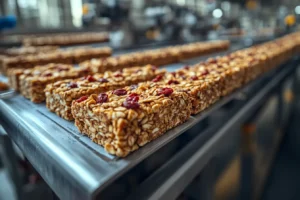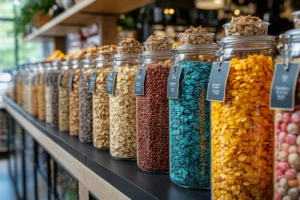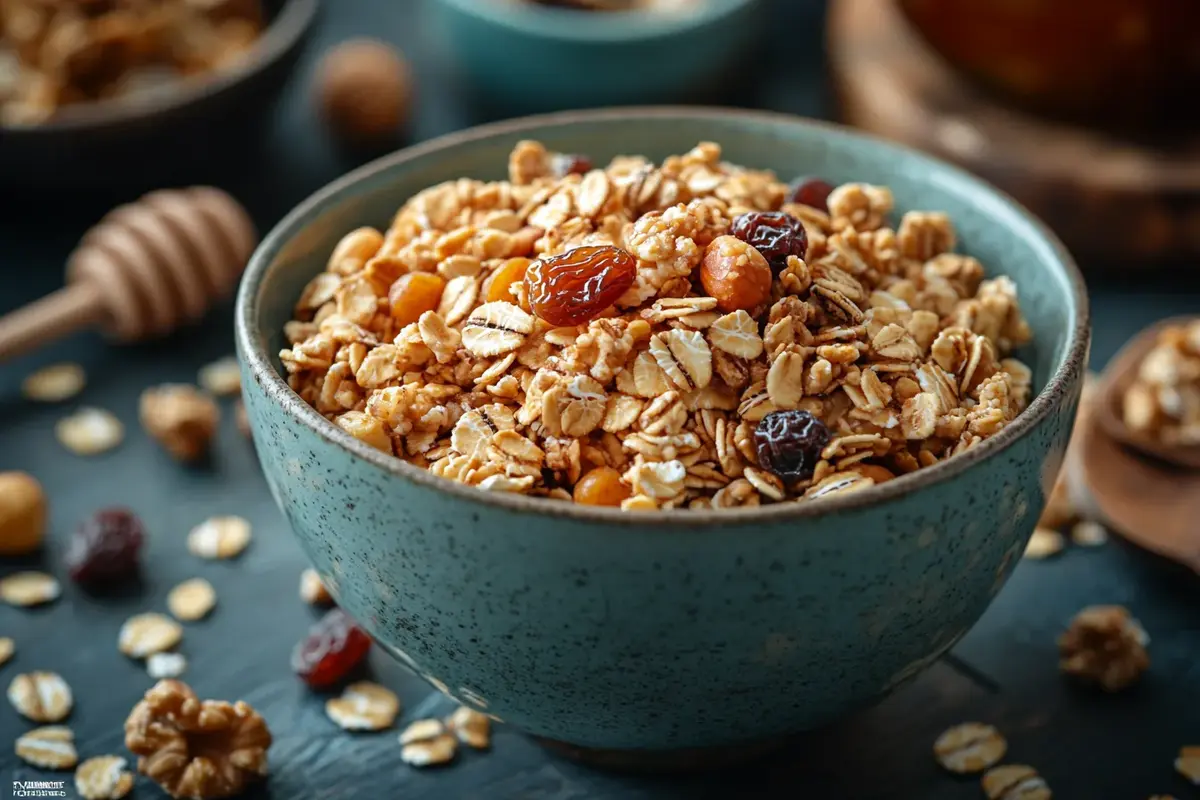Granola, once a staple of health-conscious pantries, has seen shifts in popularity and market dynamics over the years. For decades, Quaker’s granola products were synonymous with wholesome nutrition and convenience. However, questions linger today: What happened to Quaker’s granola? From its storied history to recent challenges like product recalls and changing consumer tastes, this article dives deep into the evolution of Quaker’s granola. We’ll also explore market trends, safety concerns, and how the company is navigating its future.
Introduction to Quaker’s Granola Legacy
The History of Quaker’s Granola
Quaker’s granola story began as an extension of its oatmeal empire. Established in 1877, Quaker Oats became a pioneer in promoting wholesome breakfast solutions. The company ventured into granola in the late 20th century, aligning with the burgeoning health-food movement. Quaker’s products were marketed as the perfect blend of nutrition, taste, and convenience, quickly becoming a favorite among families.
But granola wasn’t just a breakfast option—it symbolized a lifestyle. Consumers associated granola with fitness, outdoor adventures, and clean eating. Quaker capitalized on this trend, launching a variety of flavors and packaging options to cater to a growing audience.
Granola as a Healthy Lifestyle Symbol
Granola’s popularity soared in the 1980s and 1990s, becoming a cultural icon for healthy living. Quaker’s granola became a household name, featured in everything from cereal bowls to on-the-go snack bars. Its campaigns emphasized the natural goodness of oats, nuts, and honey, resonating with a generation seeking simple, nutritious options.
However, the health food market is ever-evolving, and trends like low-carb diets, organic ingredients, and artisan food production began reshaping consumer preferences. These shifts laid the groundwork for challenges Quaker’s granola would face in maintaining its stronghold.
Key Events Leading to the Current Status
Changes in Product Line
Over the years, Quaker Oats expanded its granola offerings, introducing quaker granola cereal in various flavors. These products initially resonated with health-conscious consumers. However, as dietary preferences evolved, the company made significant changes to its lineup. Classic granola cereals gave way to snack bars and flavored granola blends. While these were popular at first, they couldn’t sustain the same level of enthusiasm as the original products.
Quaker also faced challenges in differentiating its products from competitors. New brands began offering organic, gluten-free, and artisanal granola options, leaving Quaker’s traditional offerings feeling outdated. This shift in consumer demand signaled trouble for their once-thriving granola segment.
Recalls and Controversies
One of the most significant setbacks for Quaker’s granola products was product recalls. In recent years, a recall for salmonella contamination affected their granola bars and cereals, including quaker granola cereal. This led to widespread consumer concern and diminished trust in the brand’s quality control processes.
Although Quaker acted quickly to address the issue, the damage was done. Consumers increasingly associated the brand with safety risks, which further drove them to explore alternative products. Such incidents highlight the challenges of maintaining quality in large-scale food production.
Shifting Consumer Preferences
Trends like low-carb diets and a focus on protein-rich or plant-based foods led many consumers to move away from traditional granola. Brands offering innovative, clean-label products gained traction, while Quaker’s offerings struggled to adapt. Consumers began to prioritize transparency in sourcing and packaging, an area where artisanal brands outperformed established giants like Quaker.
The Role of Recalls and Safety Concerns
Specific Recall Incidents
The recall of quaker granola cereal and bars due to salmonella contamination marked a turning point. The incident prompted a thorough review of production facilities and increased scrutiny from regulators and consumers alike. This was not the first time a recall had impacted the brand, but it was among the most high-profile cases.
These recalls raised questions about the effectiveness of Quaker’s safety protocols. Even though the company emphasized corrective actions, the long-term impact on consumer trust proved significant. Quaker’s reputation as a reliable choice for families took a hit, as customers sought assurance from smaller, more transparent brands.

Impact on Consumer Trust
Safety concerns don’t just affect sales—they erode loyalty. When customers hear about contamination risks in products like quaker granola cereal, they often reevaluate their buying decisions. Trust is critical in the food industry, and once it’s lost, regaining it can take years.
Brands that have faced recalls often need to work twice as hard to rebuild their image. For Quaker, this has meant focusing on safety improvements, enhancing quality control, and rethinking product offerings to align with consumer expectations.
The Market Dynamics of Granola

Competition in the Granola Industry
The granola market has transformed significantly, becoming more competitive than ever. While Quaker’s traditional quaker granola cereal once dominated grocery store shelves, newer brands began capitalizing on changing consumer demands. Organic, gluten-free, and high-protein options entered the market, catering to niche audiences. Companies like Nature’s Path and KIND innovated with creative flavors and eco-conscious packaging, capturing a younger demographic.
This competition wasn’t just about ingredients—it was about storytelling. Brands that emphasized sustainability, transparent sourcing, and personalized nutrition thrived, while legacy companies like Quaker struggled to keep up. Consumers today don’t just buy products—they invest in values.
Evolving Consumer Expectations
Modern consumers demand more from their food. With a focus on health and wellness, many are seeking clean-label products free from artificial additives. This trend directly impacted traditional brands like Quaker, whose granola products often contained preservatives and sweeteners.
Additionally, dietary trends like keto and paleo led to a rise in grain-free granola alternatives, leaving quaker granola cereal feeling less relevant to these markets. To compete, Quaker would need to innovate—not only by reformulating their products but also by aligning their branding with modern values.
Quaker’s Response and Future Outlook
Steps Taken to Address Issues
In response to the challenges surrounding recalls and declining market share, Quaker implemented several strategies. These included enhanced quality control measures, new safety protocols, and an effort to reconnect with customers. While these steps aimed to reassure consumers, regaining trust in a crowded market proved challenging.
Quaker also reintroduced some beloved classics with modern twists. By emphasizing whole grains, reduced sugar, and eco-friendly packaging, they sought to align their offerings with current trends. These efforts show the company’s recognition of the growing demand for healthier, more transparent products.
Potential Revival Strategies
The big question remains: What happened to Quaker’s granola? Can it make a comeback? To stay relevant, Quaker might need to embrace even bolder changes. Collaborating with influencers, promoting plant-based options, and highlighting sustainability could attract younger buyers. Additionally, expanding into online markets or offering subscription services for granola products might help Quaker regain its competitive edge.
FAQs About Quaker’s Granola
Why Was Quaker’s Granola Discontinued in Certain Areas?
Many consumers wonder, What happened to Quaker’s granola? While the brand hasn’t completely phased out its granola products, availability has become limited in certain regions. This change is likely due to declining demand, increased competition, and shifts in consumer preferences. Retailers often prioritize shelf space for fast-moving items, which may have pushed Quaker’s granola products out of some stores.
Is Quaker’s Granola Still Safe to Eat After Recent Recalls?
Yes, Quaker has addressed the safety concerns that led to its recalls, particularly the salmonella contamination issue. The company has introduced stricter quality controls to ensure its products, including quaker granola cereal, meet the highest safety standards. Customers are encouraged to check the latest updates on product recalls to stay informed.
What Alternatives Does Quaker Offer for Granola Lovers?
For those missing classic quaker granola cereal, Quaker offers snack bars, flavored granola blends, and other oat-based products. While these aren’t direct replacements, they provide similar flavors and textures. Exploring these alternatives may help satisfy that granola craving while the brand refines its offerings.
How Does Quaker Compare With New Granola Brands in 2025?
Compared to newer granola brands, Quaker’s offerings might feel traditional. Many competitors focus on niche markets, like gluten-free, vegan, or organic granola. Quaker’s strength lies in its legacy, but adapting to modern trends—such as sustainable practices and innovative flavors—could help the brand regain relevance.
Conclusion
Reflecting on What Happened to Quaker’s Granola
The decline of Quaker’s granola highlights the challenges even well-established brands face in a rapidly changing market. From safety recalls to evolving consumer tastes, a combination of factors has impacted its prominence. Yet, the story of quaker granola cereal is far from over.
Quaker has taken meaningful steps to address past issues and align with current trends. Whether the brand can fully reclaim its position depends on its ability to innovate, connect with consumers, and stay true to its legacy of delivering wholesome, nutritious products.
Looking Ahead
As the granola market continues to grow, Quaker has an opportunity to reintroduce its products with a fresh perspective. By embracing sustainability, health-focused options, and digital marketing strategies, the company can write a new chapter in its granola journey. For loyal fans and newcomers alike, the future of Quaker’s granola may hold exciting possibilities.
